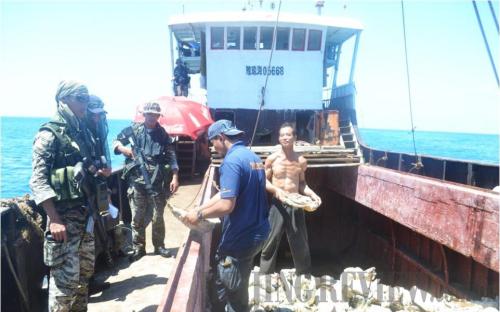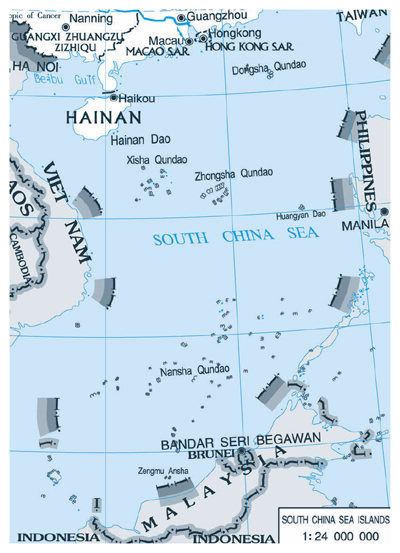|
 |
|
ILLEGAL BOARDING: Armed Philippine sailors inspect a Chinese fishing boat near the Huangyan Island on April 10 (CFP) |
With regard to the current standoff near the Huangyan Island, China will keep a restrained stance and won't take preemptive measures. However, it will counter if the Philippines provokes further.
Some Southeast Asian nations have taken a tough line on the South China Sea in light of both domestic and external factors. In particular, when the United States announced a pivot to the Asia-Pacific region last year, the Philippines and Viet Nam agreed strongly with the United States. They hope to make use of the U.S. strategy.
Southeast Asian nations that claim territories in the South China Sea have adopted a two-pronged policy under which they ask for Chinese economic cooperation while seeking a security umbrella from the United States.
China is the largest trade partner of the Association of Southeast Asian Nations (ASEAN). Trade with ASEAN set a new record of $362.9 billion in 2011, increasing 24 percent from 2010. During the visit of Philippine President Aquino III to China in 2011, China signed more than $10 billion in contracts with the Philippines. But this president with partial Chinese descent fired harsh rhetoric at China as soon as he flew back to Manila.
In the security realm, some Southeast Asian nations would like to cooperate with the United States, including arms purchases and joint military exercises. Though China could use trade and economic leverage to rein in these countries, it has refrained from exerting such means.
Patience is always needed to resolve territorial disputes between countries. If they adopt rude attitudes, draw unrelated parties into negotiations, or seek support from a superpower, the disputes will become more complicated. Now, the Philippines should start holding talks with China, instead of going out of its way to solicit U.S. support. Only a bilateral solution will keep the Huangyan Island situation from escalating.
Huangyan Island
The Huangyan Island in the South China Sea is China's inherent territory. China has ample jurisprudential evidence supporting its sovereign rights over the island. China was the first to discover and name the Huangyan Island and also the first to include the island into its territory and exercise sovereign jurisdiction over it.
The waters surrounding the Huangyan Island have been a traditional fishing ground for Chinese fishermen. Since ancient times, Chinese fishermen have been fishing in waters surrounding the island. China's National Bureau of Statistics, the China Earthquake Administration and the State Oceanic Administration of China have carried out multiple scientific research programs on the Huangyan Island and its adjacent waters.
Prior to 1997, the Philippines had no objection to the Chinese Government's exercise of sovereign administration, development and exploitation of the Huangyan Island. Instead, it expressed on many occasions that the island is outside the scope of the Philippine territory. On official Philippine maps published in 1981 and 1984, the island is also marked outside Philippine territorial limits.
The UN Convention on the Law of the Sea allows coastal states to claim a 200-nautical-mile exclusive economic zone, but coastal states have no rights to undermine other countries' inherent territorial sovereignty based on that. Any attempt to change the ownership of territorial sovereignty by using the convention is against international laws as well as the purpose and principle of the convention.
(Source: China's Foreign Ministry)

The author is a research fellow with the China Institute of International Studies
Email us at: yanwei@bjreview.com | 